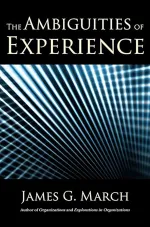“Experience may be the best teacher, but it is not a particularly good teacher,” Stanford GSB Professor James March says in his new book, The Ambiguities of Experience. Whether experience is the best teacher, or the teacher of fools, makes March reflect on the unexpected problems organizations (and the individuals in them) face when they rely on experience to adapt, improve, and survive.
In The Ambiguities of Experience, March asks a deceptively simple question: What is, or should be, the role of experience in creating intelligence, particularly in organizations? Folk wisdom both trumpets the significance of experience and warns of its inadequacies. On one hand, experience is described as the best teacher. On the other hand, experience is described as the teacher of fools, of those unable or unwilling to learn from accumulated knowledge or the teaching of experts. The disagreement between those folk aphorisms reflects profound questions about the human pursuit of intelligence through learning from experience that have long confronted philosophers and social scientists. This book considers the unexpected problems organizations (and the individuals in them) face when they rely on experience to adapt, improve, and survive.
